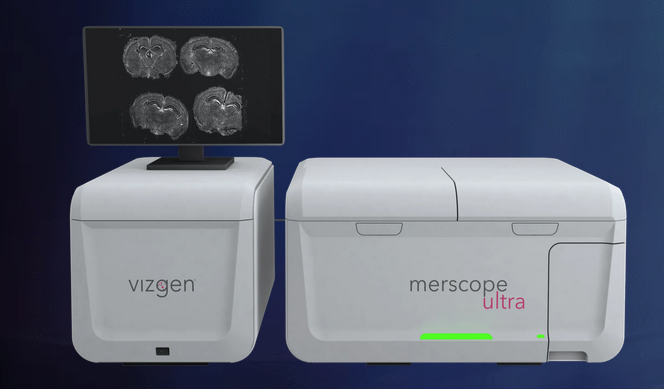CAMBRIDGE, Mass. – A newly published study in Nature Neuroscience highlights the pivotal role of Vizgen’s MERSCOPE® platform in advancing the understanding of aging-related brain degeneration. The peer-reviewed paper, which appears as the June cover story, demonstrates how single-cell and spatial transcriptomics can unravel complex cellular interactions that contribute to white matter deterioration in aging brains.
The study, titled “Microglia activation orchestrates CXCL10-mediated CD8+ T cell recruitment to promote aging-related white matter degeneration,” was conducted by researchers from the Technical University of Munich, the University Hospital Würzburg, and the German Center for Neurodegenerative Diseases. It reveals how maladaptive microglial activation leads to the recruitment of harmful CD8+ T cells, triggering degeneration in myelinated axons—a key factor in cognitive decline and increased risk for neurodegenerative disease in aging populations.
Using Vizgen’s MERSCOPE platform, the researchers were able to analyze the spatial organization and molecular activity of rare immune cells within highly structured white matter tissue. The high resolution, sensitivity, and spatial transcriptomics capabilities of the platform provided insights that would have been difficult or impossible to achieve with conventional omics tools.
“In our study, the spatial transcriptomics approach was specifically designed to identify signals around rare T cells in aging white matter,” said Janos Groh, Senior Research Associate at the Technical University of Munich. “Vizgen’s MERSCOPE platform allowed us to analyze their cellular niches in fine detail and uncover new functions of microglia that are central to aging-associated white matter changes.”
White matter naturally declines in volume and integrity with age, contributing to impaired brain function. This study identifies a critical immune-driven mechanism behind that decline, demonstrating how microglia-induced inflammation contributes to CD8+ T cell accumulation and myelin damage. The findings highlight an important axis of neuroinflammation that could be a target for future interventions aimed at mitigating cognitive decline.
“This landmark paper exemplifies the groundbreaking discoveries researchers are making using our MERSCOPE platform,” said Jiang He, Vice President of Reagents and Scientific Affairs at Vizgen. “It underscores our commitment to equipping scientists with the tools they need to unlock the cellular and molecular mechanisms behind complex diseases, particularly those related to aging.”
Vizgen’s MERSCOPE and MERSCOPE Ultra™ platforms are the first complete systems designed for single-cell spatial genomics using MERFISH (Multiplexed Error-Robust Fluorescence In Situ Hybridization) technology. Widely adopted by researchers, MERSCOPE has been cited in hundreds of peer-reviewed publications and continues to support new discoveries in neuroscience, oncology, and developmental biology.
This latest study marks another milestone in spatial multi-omics research, positioning Vizgen’s technology as a central tool in efforts to understand and eventually treat neurodegenerative conditions associated with aging.


